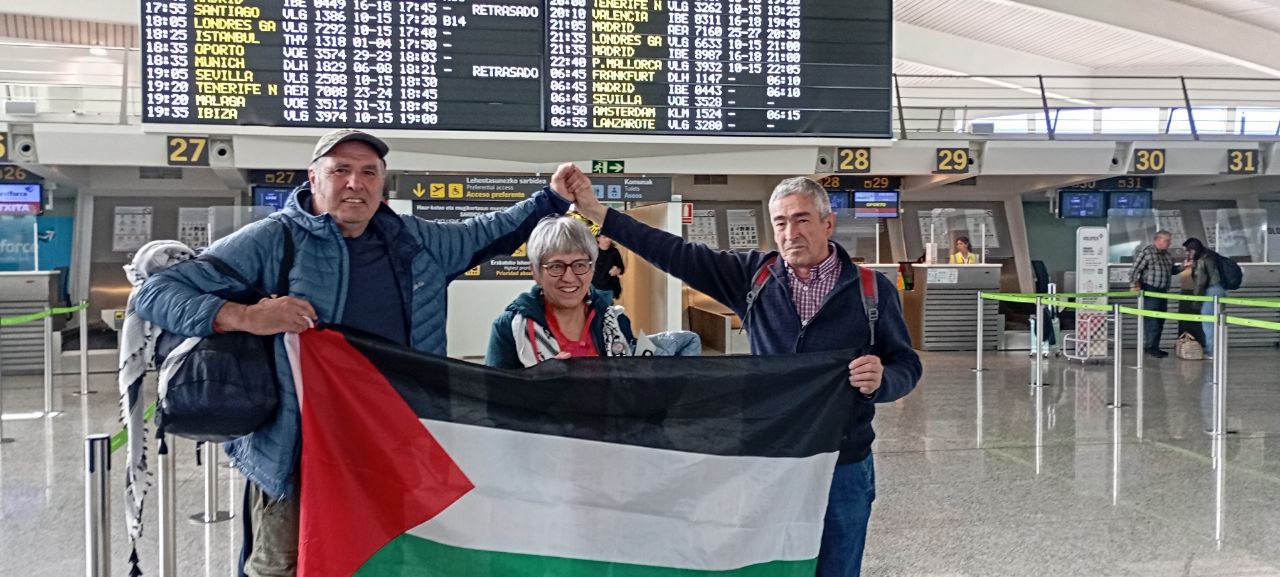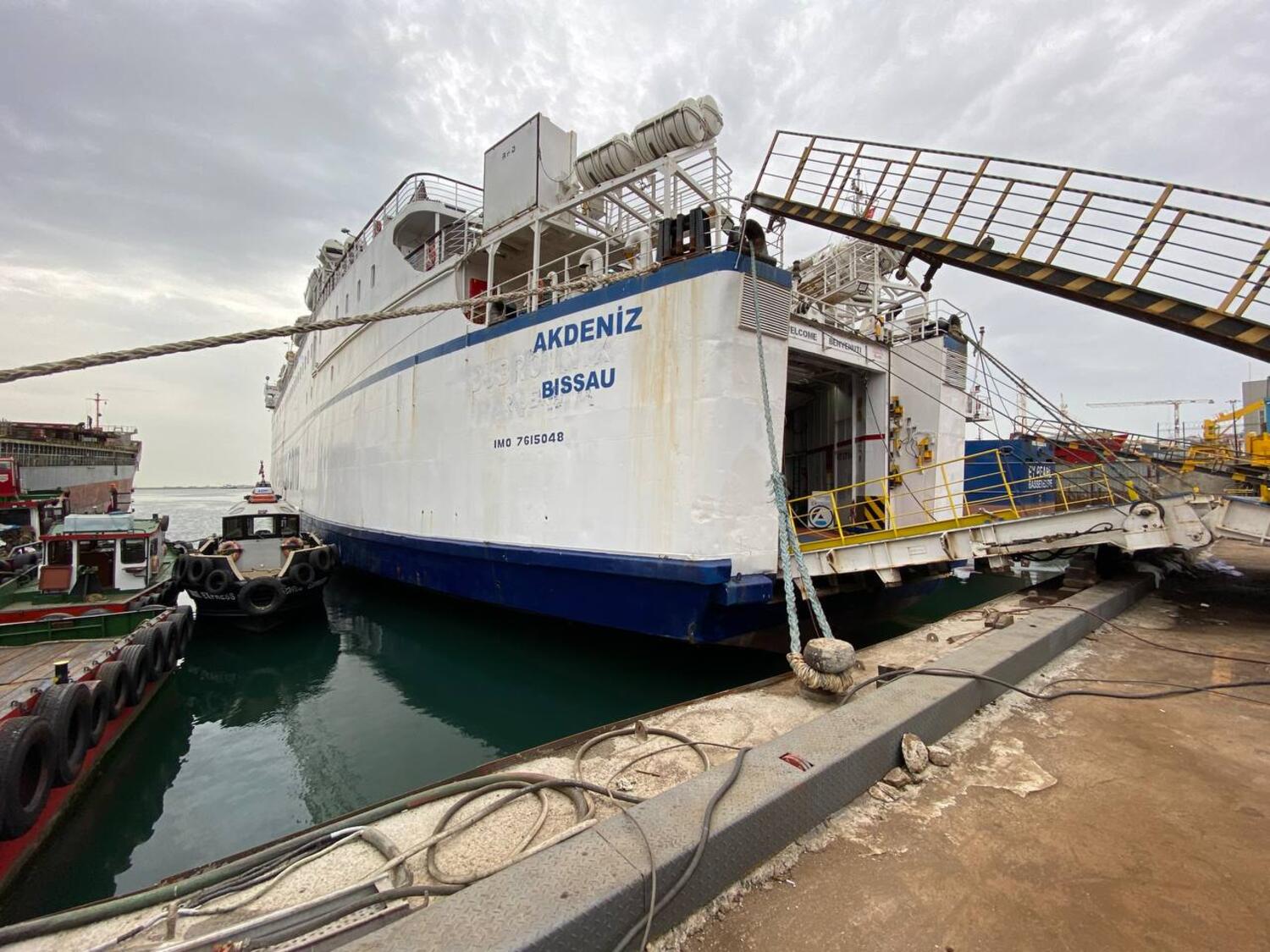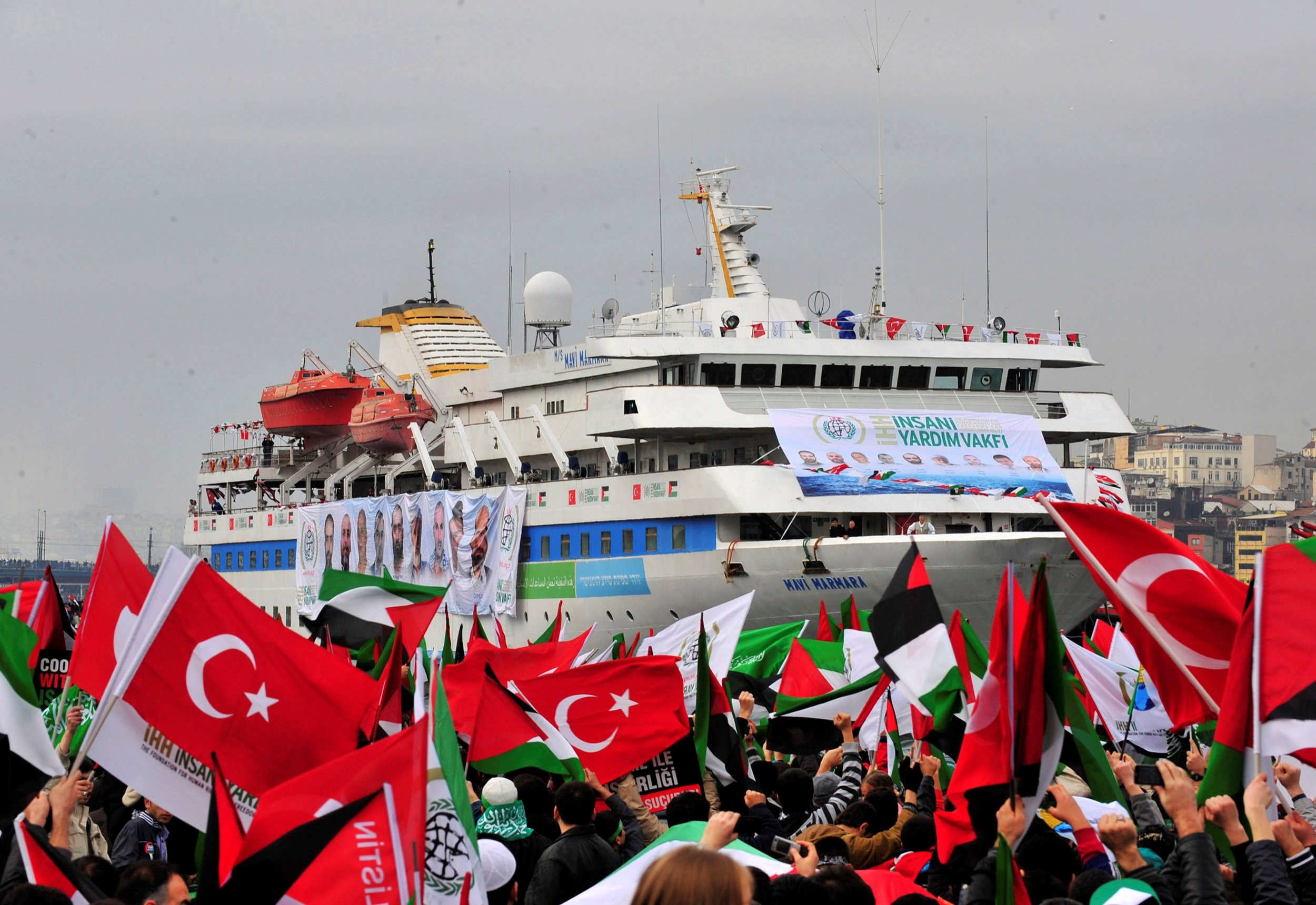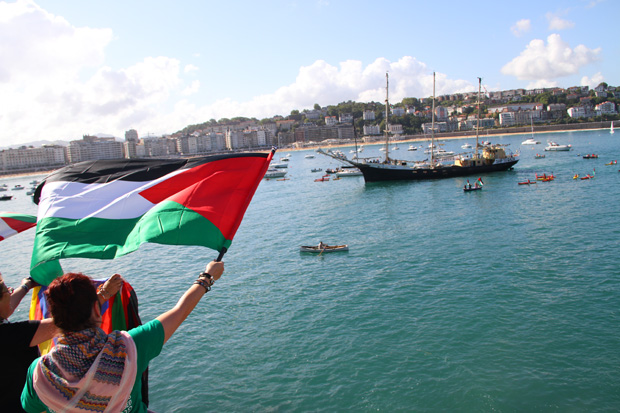"There are risks that deserve to be taken, we have to stop genocide."
- Three Basque militants participate in the Freedom Flotilla, an international initiative that aims to transport 5,500 tonnes of humanitarian aid material from Turkey to Gaza: Pili Revilla, Agus Gorbea and Mikel Zuloaga ‘Mikelon’. On 18 April they received their flight from Bilbao to Istanbul and interviewed ARGIA two days earlier. On 21 April the fleet was going to board, but "surely due to administrative problems related to Israel", we were told by the three activists who have delayed the departure from Istanbul. On the date of sending this interview to the printing press (22 April) the boarding date is not specified. We were delighted at the initiative’s approach, the risks of the journey, the opportunities and the reasons why it joins the boat. During the development of the initiative you will be able to read their chronicles in ARGIA daily.

The interview is taking place on Tuesday, two days before the trip from Bilbao to Istanbul. Once in Istanbul, what is the plan?
Mikelon: in Istanbul we will spend two days. We're going to do some nonviolent resistance workshops to predict and practice situations that may arise on the boat itself: verbal language, body -- all of this has to be done very well, so that we all are able to maintain self-consumption in situations of tension, because the Israelis are very provocative, and so that the hook is faster. These two days we will also have to use them for administrative processing. Are you planning to leave
Gaza on Sunday?
Pili Revilla: Yes, we know there is no planned stop. I imagine that at some point the Israelis will try to paralyse us, and before that they will have a strategy from our organisation, but obviously we do not have all the information, and it must be. It is a two- or three-day journey away without obstacles.
"This is an emergency mission, two million people have to starve to death, half of the children."
The Freedom Navy has announced that 5,500 tonnes of humanitarian aid material will be transported to meet basic needs. How many boats will the fleet form?
M: There are four:
a cargo ship, big, carrying material, and the other three will house international activists, observers, politicians or other prestigious people and journalists. The Freedom Flotilla announced in 2022 that it would host another trip in 2023. Therefore, did the action begin to prepare before the last massacre against Gaza?
M: I do not know since when the Turks are working on the preparation, but this has not emerged from the attack started in 2023. We are talking about large boats, hundreds of people. The Freedom Flotilla is an international coordinator who brings together movements and groups of different peoples. In Canada, Turkey, and in general in the Arab countries and in the North of Europe, it is quite strong, for example in Spain less.
The first Freedom Flotilla came out in 2010, the Israeli army boarded the ship, killed 11 people and wounded others. Since then, many other trips have been organised, there has been no aggression of the size of the first, but the problems have been related to the kidnapping of boats, the blockade in the Greek port, the arrests of activists… On the other hand, Israel has killed hundreds of aid workers and civilian volunteers, even Western ones, during these months. What body do you go with?
P. R: I'm a little nervous, because it's the first time I'm in the fleet, and because of the news these days, like the news you mentioned or the Iran-Israel conflict. That makes me turn my head, think we'll probably live a very dangerous situation. But we're going to have a big team, a responsible team, nobody's going to run unnecessary risks. And in any case, there are risks that deserve to be taken, there is a lot at stake, we have to stop genocide.
Agus Gorbea: I have sensations similar to Pili's. There's one thing I don't like. People come to me, "Hey, what do you really have to do? Or, "We have to say goodbye before we go," -- I'm nourished by nervousness. What can happen? That is very clear. The most extreme things? I don't think, because I think they don't care.
M: What needs to be put at the centre are objective and I think it is time for non-violent resistance action. There are always risks, but we are not going to make a sacrifice, but to take action: the aim is to enter Gaza. This is the time.
"We have to fight 'What am I going to move for if we are not going to get anything' because it is not true, you always get something, we always act"
The organization stresses that no coordination or cooperation with Israel will be sought. Why?
M: First of all, this is an emergency mission, two million people have to starve to death, half of them minors. Furthermore, the fleet denies that Israel has the right to decide with assistance that it may enter Gaza. We are not going to ask for permission, we are not going to allow inspections of our cargo by Israel, we are working with the members of Gaza.
Why has each of you decided to go out into the sea with the Freedom Fleet? What is your perception or relationship with the Palestinian cause?
P.A. : Before 7 October, two years, I was in the West Bank, Nablus, Jenin... I don't need the genocide being done since October to move me, because what is being done there is slow genocide, on 15 May it turns 76 years from the beginning of the genocide [Nakba or Disaster of 1948]. The situation in Gaza is even more serious, especially since October, but the same is being done throughout Palestine. With the complicity of all Western governments, of course, led by the United States. The people have mobilised against this, but not enough, I believe that the situation required a general strike at European level, of a week, which perhaps moved something.
P.R.: I have been moving around Palestine for some time. Years ago, for example, every time the Maccabi arrives in Vitoria, initiatives are organised. Traveling to Palestine didn't attract me too much because I'm a little biased, but look where I am now. Why? Because what's going on is very unfair, dramatic, obscene. There is a feeling that what we are doing is not enough, that nothing changes. I think yes, that everything influences, that if we had not mobilized Palestine the same would not exist. But I have to do something else, so I've decided to go.
M: When you see that governments are not able to stop the genocide of Israel, the genocide of that size -- for those of us who believe in nonviolent action, it's time to do these kinds of initiatives.
"We run the risk of getting used to the barbarity we are seeing directly"
The Freedom Flotilla is not only about shifting its burden to Gaza. It is also a political and communicative action that seeks to challenge the citizens of the world. Can something be done about the initiative from Euskal Herria?
P.A.: I participate in the Accountability for Palestine platform. We are tabling a motion in local councils that says that the institution will publicly break with Israel. On the one hand, it is little, more so given that many municipalities have no relationship with Israel, but the mere formal declaration is also important. It may be added to the motion that the fleet should allow itself to enter Gaza for food to enter and end the blockade.
M: All the proposals that arise must be supported so that we do not get stuck in the way we have seen on other occasions. People in the nearby environment are mobilized, but others are not, and not strong enough to move things around.
P.R.: During the Iraq War many and many mobilizations took place, but now with Palestine not enough. It is a struggle that generates attachment, even beyond militant environments, if only for humanity. Another thing is that in today's capitalist society, comfortable positions prevail: "It's embarrassing, but we're not going to get anything, so what to try for," they say.
P.A.: We run the risk of getting used to the barbarity we are seeing directly. If this happens, any other Nazi government like Israel will have the opportunity to do whatever it wants, because it will learn that the citizens do mobilise, but not enough. We have to oppose the "why am I going to move if we are not going to get anything" that Pili explained, because it is not true, you always get something, we always act.
Istanbul. 27 April, Saturday.
Ninth day in Istanbul. The Freedom Flotilla is hit another hard blow. The flag and documentation of Guinea-Bissau have been taken from the Akdeniz, so it has no permit to embark. For the time being, the initiative has been suspended and all... [+]
Istanbul. Thursday, 25 April.
Seventh day in Istanbul. The problems have been going on these days, and we have to say that the Freedom Flotilla will not be able to depart on Friday. We'll leave, but not now. We are under enormous pressure. The US, Germany, the UK and, of course,... [+]
Istanbul, Monday, 22 April.
Fourth day in Istanbul, waiting for the Freedom Flotilla to come out. The expected departure of yesterday, by 21, has had to be delayed due to problems with the smell of Israel. Instead of launching the boats, we are demonstrating in Istanbul to... [+]
Istanbul, Saturday, 20 April.
Yesterday, day 19, was quiet and we had meetings with people from different parts of the State and international delegations. The organization has explained that they have received 12,000 requests to participate in the fleet, but it will involve... [+]
Although the occupation of the whole of Palestine and the blockade of Gaza have been growing for decades, it was difficult to imagine a few months ago the size of the attacks on the Palestinian population to become genocide.
Since October, day by day, month by month, we have... [+]



















